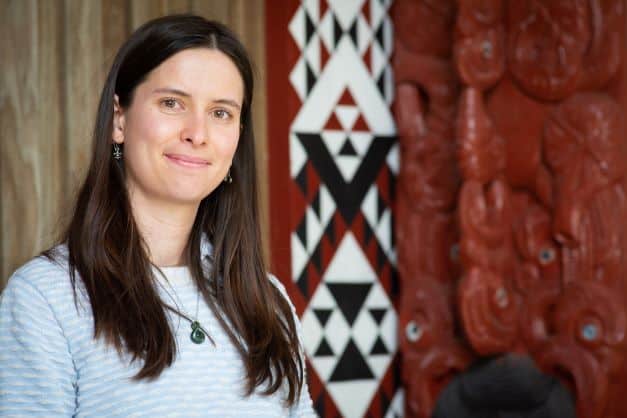Adaptive Governance and Policy, the investment that “tackles the ways in which governance and policy need to change to better protect te taiao”, are celebrating the recent release of two documents that demonstrate the importance and value of Te Tiriti o Waitangi, tikanga and care-informed relationships.
One of the documents is titled Caring For Our Special Places and Relationships: Guidance on relational approaches to environmental governance in Aotearoa – For Policy and Decision Makers.

“Yes, it’s for policy makers,” says Te Kawa a Māui Research Fellow, Ellie Tapsell (Te Arawa, Tainui, Irish, British, Scottish, Danish). “It’s also for people who are working in environmental decision making. Maybe they have funding to work with, or they have projects they’re leading. This document offers them the opportunity to take a step back and reflect on their relationships and how they work with mana whenua and the environment in care-based ways.”
The work grew out of Ellie’s 2022 Master’s thesis, Transitioning Environmental Governance in Aotearoa: Tikanga Māori and Political Ethic of Care, a key focus of which describes how tikanga Māori and care ethics can inform better environmental governance, acknowledging that environmental care can’t exist in isolation, and relies on the fostering of equitable and fair relationships across communities.
“I found in my research that our current governance systems do not really support caring and reciprocal decision making or relationships with the environment or each other, and we’re having real problems making good relationships across the kāwanatanga, tangata Tiriti (Treaty partners) and tangata whenua spaces,” says Ellie.
“Whereas tikanga Māori is based around relationships and balance, therefore when it is guiding decision making there are often better more reciprocal outcomes for people and the environment. However, as tikanga becomes incorporated into our current colonial governance systems there is potential for it to be misappropriated.”
Ellie says kāwanatanga and tangata Tiriti relationships can be “quite extractive of Māori knowledge and of resources.”
“When Māori come to a meeting, with a council, for example, they’re often not treated as experts. They’re the cultural person who comes in to deliver the whakatau or karakia, but they’re not always respected for their expertise and relational care work they do. Often, this isn’t even noticed by the other people in the room, because they are so used to that kind of imbalance.”
Ellie Tapsell
Ellie says that even when Māori feel disrespected in these spaces, they continue to show up, because of their deep care for te taiao.
Ellie notes that the way we look after te taiao in Aotearoa often ignores these power dynamics, inequalities and Treaty breaches.
“I wanted to make a document for people who really want to do their best, but who haven’t had the chance to think about things in a different way.”
“We can’t look after te taiao in isolation,” says Ellie. “The way that we choose to tackle environmental crises can’t be separate from how we tackle our social crises.”
“Our relationships are something that we do, something that we practice. I always talk about relationships as being something that we have to be actively doing. If we’re actively having harmful relationships in the way that we treat other humans who we live with, then how will we be able to practice healthy relationships with our whanaunga who are not human?”
To explore Ellie’s guidance document and toolbox, including care worksheets and references, follow this link.
And here’s a link to the other document put out by Adaptive Governance and Policy this month: Steps Towards Authentic Te Tiriti o Waitangi Relationships at a Local Government Level.
Kerry Donovan Brown